PUBLIC ENEMY / “By The Time I Get To Arizona”
The Contemporary track for this week, The Roots’ “False Media” pays tribute—albeit subtly—to not one, but two Public Enemy songs. Given that the songs in question were originally released almost twenty years ago, it occurs to me that a lot of Roots fans might not catch the connections.
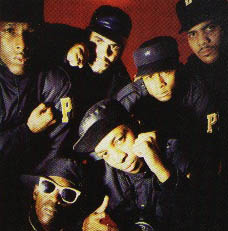 First up is “Don’t Believe The Hype” from P.E.’s 1988 classic It Takes A Nation Of Millions To Hold Us Back. The title of the Roots song comes from Chuck D’s line at the end of the first verse. “False media,” Chuck raps, “We don’t need it, do we?” Also, earlier in the same verse, Chuck says a line that The Roots reused as part of the chorus of “False Media”: “I don’t rhyme for the sake of riddling.” With both of those lines, Chuck was talking about the print media’s (mis)interpretation of Public Enemy’s music. When The Roots reused the lines, they shifted the meaning to a wider scale. They’re talking about the way the media fell hook, line and sinker for Bush and his fellow Neo-Cons’ calls for war in order to ‘protect our freedom’ and/or ‘find weapons of mass destruction’ and/or ‘free the Iraqi people.’ (What’s the current excuse de jour? ‘Complete the mission,’ is it? I wonder how long we’re supposed to buy that one.)
The other P.E. connection is the way The Roots’ guest vocalist Wadud Ahmad imitates the sardonic drawl Chuck D used for P.E.’s 1989 album track “Pollywannacraka” (from Fear Of A Black Planet). Taken alone, I might not have thought The Roots were consciously copying Chuck, but given the other P.E. references in the same song, I think they are. Listen to the two songs, listen again, then do the only thing you can do: admit that I'm right.
First up is “Don’t Believe The Hype” from P.E.’s 1988 classic It Takes A Nation Of Millions To Hold Us Back. The title of the Roots song comes from Chuck D’s line at the end of the first verse. “False media,” Chuck raps, “We don’t need it, do we?” Also, earlier in the same verse, Chuck says a line that The Roots reused as part of the chorus of “False Media”: “I don’t rhyme for the sake of riddling.” With both of those lines, Chuck was talking about the print media’s (mis)interpretation of Public Enemy’s music. When The Roots reused the lines, they shifted the meaning to a wider scale. They’re talking about the way the media fell hook, line and sinker for Bush and his fellow Neo-Cons’ calls for war in order to ‘protect our freedom’ and/or ‘find weapons of mass destruction’ and/or ‘free the Iraqi people.’ (What’s the current excuse de jour? ‘Complete the mission,’ is it? I wonder how long we’re supposed to buy that one.)
The other P.E. connection is the way The Roots’ guest vocalist Wadud Ahmad imitates the sardonic drawl Chuck D used for P.E.’s 1989 album track “Pollywannacraka” (from Fear Of A Black Planet). Taken alone, I might not have thought The Roots were consciously copying Chuck, but given the other P.E. references in the same song, I think they are. Listen to the two songs, listen again, then do the only thing you can do: admit that I'm right.
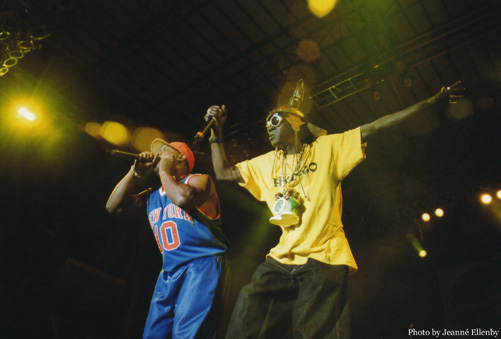 “By The Time I Get To Arizona” (from Apocalypse '91: The Enemy Strkes Black) is one of my all-time favorite P.E. songs because Chuck is so angry and self-righteous that he stops making sense at all. (I say ‘at all’ because even at his most sensible, Chuck never made complete sense.) Dig the premise: circa 1991, New Hampshire and Arizona were the only states in the union still refusing to declare Martin Luther King’s birthday an official state holiday. Public Enemy’s reaction to those states’ “psychological discomfort in paying tribute to a black man who tried to teach white people the meaning of civilization”? How’s about a road trip to Arizona to blow up the capitol building and assassinate the governor. It might occur to you—as it occurs to me—that murder and mass violence is a slightly incongruous way to defend the honor of a man who gave his life to the cause of non-violence. It occurred to Chuck too. “He was my hero,” Chuck retorted. “I’ll fight for him however I want.” While on the road, P.E. flipped off well-meaning Arizonians (“what’s a smiling face when the whole state’s racist?”) and “urinated on the state while kicking this song.”
Songs like “By The Time I Get To Arizona” are the reason Public Enemy was so-loved during the Eighties and Nineties: they never let reason or rationality get in the way of a good fight. Despite some of their more suspect arguments (their regressive attitude towards professionally-inclined black women, for one), P.E.’s better moments remain believable and effective because they were pissed off about things worth being pissed off about. Today’s MCs are pissed off because they keep getting pulled over for cruising through the ghetto in pimped-out Maybachs and because ‘the haters’ won’t stop whispering behind their backs. I’m not sure I can dredge up much sympathy for either one of those particular difficulties. I was 15 minutes late for work yesterday and my girlfriend lives in Japan. Those are problems too—that doesn’t mean you want to hear me whining about it on the radio. Chuck D, on the other hand, was pissed off about historical shit. About systemic shit. About malt liquor being marketed almost exclusively to poor black people. About the lack of recognition for heroic figures like Martin Luther King. About other MCs glorifying—or at least being ambivalent about—crack cocaine. (Although back then, most of us were still figuring out exactly how fucked up the stuff was.) And one more thing: today, both Arizona and New Hampshire recognize King Day. I’m not saying P.E. had anything to do with that, but it got done.
“By The Time I Get To Arizona” (from Apocalypse '91: The Enemy Strkes Black) is one of my all-time favorite P.E. songs because Chuck is so angry and self-righteous that he stops making sense at all. (I say ‘at all’ because even at his most sensible, Chuck never made complete sense.) Dig the premise: circa 1991, New Hampshire and Arizona were the only states in the union still refusing to declare Martin Luther King’s birthday an official state holiday. Public Enemy’s reaction to those states’ “psychological discomfort in paying tribute to a black man who tried to teach white people the meaning of civilization”? How’s about a road trip to Arizona to blow up the capitol building and assassinate the governor. It might occur to you—as it occurs to me—that murder and mass violence is a slightly incongruous way to defend the honor of a man who gave his life to the cause of non-violence. It occurred to Chuck too. “He was my hero,” Chuck retorted. “I’ll fight for him however I want.” While on the road, P.E. flipped off well-meaning Arizonians (“what’s a smiling face when the whole state’s racist?”) and “urinated on the state while kicking this song.”
Songs like “By The Time I Get To Arizona” are the reason Public Enemy was so-loved during the Eighties and Nineties: they never let reason or rationality get in the way of a good fight. Despite some of their more suspect arguments (their regressive attitude towards professionally-inclined black women, for one), P.E.’s better moments remain believable and effective because they were pissed off about things worth being pissed off about. Today’s MCs are pissed off because they keep getting pulled over for cruising through the ghetto in pimped-out Maybachs and because ‘the haters’ won’t stop whispering behind their backs. I’m not sure I can dredge up much sympathy for either one of those particular difficulties. I was 15 minutes late for work yesterday and my girlfriend lives in Japan. Those are problems too—that doesn’t mean you want to hear me whining about it on the radio. Chuck D, on the other hand, was pissed off about historical shit. About systemic shit. About malt liquor being marketed almost exclusively to poor black people. About the lack of recognition for heroic figures like Martin Luther King. About other MCs glorifying—or at least being ambivalent about—crack cocaine. (Although back then, most of us were still figuring out exactly how fucked up the stuff was.) And one more thing: today, both Arizona and New Hampshire recognize King Day. I’m not saying P.E. had anything to do with that, but it got done.
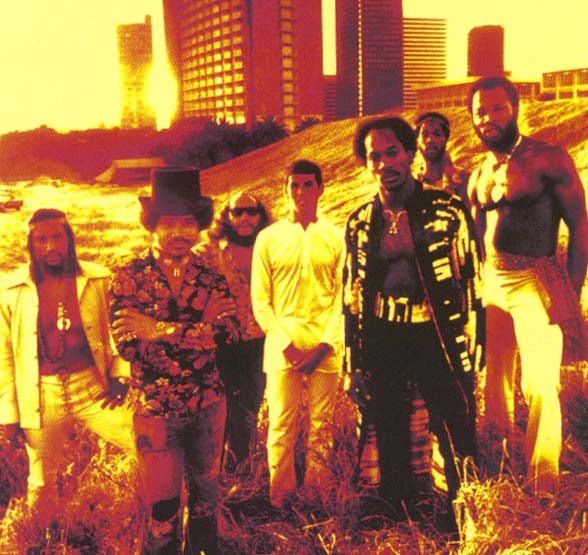 Finally, how’s about a couple of bonus tracks for the sample seekers out there. The first is Mandrill’s “Two Sisters Of Mystery,” a psychedelic funk-rock record that sounds something like Funkadelic covering Black Sabbath. (“Two Sisters” is from Mandrill’s 1973 Polydor album Just Outside Of Town.) I’m particularly impressed by the horrible sound quality of the bassline: it’s got so much fuzz in it that you’ll think you’ve blown a speaker cone. When Public Enemy sampled “Two Sisters” for “By The Time I Get Arizona,” they cleaned up the bass and slowed down the beat a little, but it survives mostly intact.
Finally, how’s about a couple of bonus tracks for the sample seekers out there. The first is Mandrill’s “Two Sisters Of Mystery,” a psychedelic funk-rock record that sounds something like Funkadelic covering Black Sabbath. (“Two Sisters” is from Mandrill’s 1973 Polydor album Just Outside Of Town.) I’m particularly impressed by the horrible sound quality of the bassline: it’s got so much fuzz in it that you’ll think you’ve blown a speaker cone. When Public Enemy sampled “Two Sisters” for “By The Time I Get Arizona,” they cleaned up the bass and slowed down the beat a little, but it survives mostly intact.
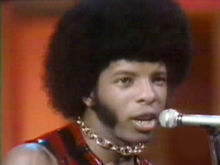 The second track is Sly Stone’s “Life Of Fortune And Fame” which The Roots sampled for the chorus of “Game Theory.” (“Life Of Fortune” is a Sly song that dates from his pre-Family Stone days. It’s available on Precious Stone: In the Studio With Sly Stone 1963-1965.) For me, the type of sampling The Roots do here is the best kind there is. Meaning, it’s the kind where the new usage puts the sampled voices or sounds in an entirely different context. The Roots aren’t sampling a groove or a hook or even a vocal per se, it’s more like they’re using Sly’s voice as if it were an instrument; they capture the sounds, slice them into movable pieces, then put them back together in a way that enhances what they’re trying to do musically.
—Mtume ya Salaam
Dear Sherlock, AKA Mtume,
Once again you sleuth around until you root out the reality and then publicly throw down. You are an esteemed enemy of ignorance. I sit, slack-jawed at your feet, wondering how the fuck you found out all that stuff. Do you got a book somewhere with all kinds of arcane info in it? Is there a parallel internet you visit?
And to think, I can remember when I not only took you to a P.E. concert at the Municipal Auditorium in Armstrong Park in beautiful downtown New Orleans, but we went backstage and you were present when I interviewed Chuck D. We both noted his seriousness—and the lack of backstage groupies, which was unusual for a popular group.
On another note, I would suggest that one reason P.E. is out of fashion is because there is no Bomb Squad today, no group of sound scientists willing to spend twenty hours to splice in three seconds of sound so that it sounds organic to the song even though its origin is completely out of left field. Plus, legally, most artists can neither afford nor get away with sampling as much as P.E. did.
The second track is Sly Stone’s “Life Of Fortune And Fame” which The Roots sampled for the chorus of “Game Theory.” (“Life Of Fortune” is a Sly song that dates from his pre-Family Stone days. It’s available on Precious Stone: In the Studio With Sly Stone 1963-1965.) For me, the type of sampling The Roots do here is the best kind there is. Meaning, it’s the kind where the new usage puts the sampled voices or sounds in an entirely different context. The Roots aren’t sampling a groove or a hook or even a vocal per se, it’s more like they’re using Sly’s voice as if it were an instrument; they capture the sounds, slice them into movable pieces, then put them back together in a way that enhances what they’re trying to do musically.
—Mtume ya Salaam
Dear Sherlock, AKA Mtume,
Once again you sleuth around until you root out the reality and then publicly throw down. You are an esteemed enemy of ignorance. I sit, slack-jawed at your feet, wondering how the fuck you found out all that stuff. Do you got a book somewhere with all kinds of arcane info in it? Is there a parallel internet you visit?
And to think, I can remember when I not only took you to a P.E. concert at the Municipal Auditorium in Armstrong Park in beautiful downtown New Orleans, but we went backstage and you were present when I interviewed Chuck D. We both noted his seriousness—and the lack of backstage groupies, which was unusual for a popular group.
On another note, I would suggest that one reason P.E. is out of fashion is because there is no Bomb Squad today, no group of sound scientists willing to spend twenty hours to splice in three seconds of sound so that it sounds organic to the song even though its origin is completely out of left field. Plus, legally, most artists can neither afford nor get away with sampling as much as P.E. did.
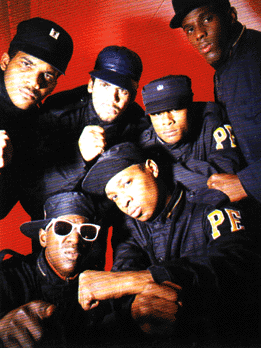 You remember Chuck saying how part of the goal was to create a sound that was instantly identifiable? If my memory serves, Chuck used the example of a jeep speeding down the street. You’re standing on the corner, it turns headed in the opposite direction from where you’re standing and you only hear a few seconds of whatever sounds the jeep is bumping. If they were playing P.E., Chuck’s goal was that amid everything that was going down on that corner, just from hearing those quickly fleeting three seconds you would KNOW it was P.E.
There was a goal and there was a mixing method, all in addition to the message. No bout a-doubt it, P.E. was a milestone in Black music. Thanks for dropping this lesson in P.E. 202 (if anyone didn’t take or took it and flunked P.E. 101, you might want to take a refresher by clicking here for a previous posting).
—Kalamu ya Salaam
P.S. New Hampshire is a real state. Last year I was up there twice. It’s between Vermont and Maine, above New York. I don’t know how many people up there are into P.E. And what you said about pronouncing the name of the state is interesting, especially when you consider one of the more famous American standards is “Moonlight In Vermont” and of course there are all kinds of songs for New York. And, though it’s not a song, there was a very famous battle cry, “Remember the Maine.” But for the life of me, I can’t think of any memorable reference to New Hampsire in popular culture.
You remember Chuck saying how part of the goal was to create a sound that was instantly identifiable? If my memory serves, Chuck used the example of a jeep speeding down the street. You’re standing on the corner, it turns headed in the opposite direction from where you’re standing and you only hear a few seconds of whatever sounds the jeep is bumping. If they were playing P.E., Chuck’s goal was that amid everything that was going down on that corner, just from hearing those quickly fleeting three seconds you would KNOW it was P.E.
There was a goal and there was a mixing method, all in addition to the message. No bout a-doubt it, P.E. was a milestone in Black music. Thanks for dropping this lesson in P.E. 202 (if anyone didn’t take or took it and flunked P.E. 101, you might want to take a refresher by clicking here for a previous posting).
—Kalamu ya Salaam
P.S. New Hampshire is a real state. Last year I was up there twice. It’s between Vermont and Maine, above New York. I don’t know how many people up there are into P.E. And what you said about pronouncing the name of the state is interesting, especially when you consider one of the more famous American standards is “Moonlight In Vermont” and of course there are all kinds of songs for New York. And, though it’s not a song, there was a very famous battle cry, “Remember the Maine.” But for the life of me, I can’t think of any memorable reference to New Hampsire in popular culture.
This entry was posted on Sunday, November 12th, 2006 at 1:06 am and is filed under Classic. You can follow any responses to this entry through the RSS 2.0 feed. You can leave a response, or trackback from your own site.
Leave a Reply
| top |